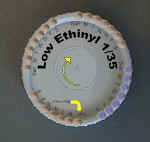|
Benefits of BCPs
BCPs provide highly
reliable contraceptive protection, exceeding 99%. Even when imperfect
use (skipping an occasional pill) is considered, the BCPs are still
very effective in preventing pregnancy.
In addition to their contraceptive benefits, the BCPs have a number
of other benefits. BCPs generally:
-
Cause menstrual cycles to occur regularly and predictably
-
Shorten menstrual flows
-
Lighten menstrual flows
-
Reduce the risk of iron deficiency anemia
-
Reduce menstrual cramps
-
Eliminate painful ovulation
-
Reduce premenstrual symptoms
-
Reduce cyclic breast pain
-
Improve acne
-
Reduce the risk of ovarian cysts
-
Reduce the risk of ovarian cancer
-
Reduce the risk of uterine cancer
-
Reduce the risk of uterine fibroid tumors
-
Reduce the risk of symptomatic endometriosis
-
Reduce the risk of pelvic inflammatory disease
-
Reduce the risk of benign breast disease
|
 Risks of BCPs
Aside from a number of minor, but annoying, side effects, serious
risks of BCPs are limited, for the most part, to cardiovascular
problems, including stroke, heart attack, thrombophlebitis and
thromboembolism.
-
These complications are very rare among women
under age 35 who are non-smokers,
and the added risk of BCPs is difficult to measure and probably
insignificant.
-
For non-smokers over age 35,
the increased risk of cardiovascular problems among BCP users is
measurable, but extremely small and certainly less than the risk of
pregnancy.
-
For smokers under age 35,
the increased risk of cardiovascular problems among BCP users is
measurable, but extremely small and certainly less than the risk of
pregnancy.
-
For smokers over age 35,
the increased risk of cardiovascular problems among BCP users is
very significant, and so high as to make such use ill-advised in any
but the most extraordinary circumstances.
There is also a very small, but measurable increase in the risk of
liver tumors and cysts. The incidence of such problems in the
population is so small and the added risk so marginal that only rarely
will this risk play a role in the clinical decision for or against
BCPs .
Which Pill to Start
Pick any standard, low-dose birth control pill that is
readily available.
Most women (90%) will do well on any low-dose BCP. A
few will do well only on certain BCPs, but there is no way to predict
in advance which pill will work best for any individual woman.
Historically, as the hormone dose of birth control
pills was lowered, the risk of serious complications such as blood
clots was also reduced. For that reason, starting a low-dose pill
(30-35 mcg of estrogen) is preferable to starting medium dose (50 mcg)
or high dose BCPs. Lowering the dose below the 30-35 mcg dose has not,
however, led to any additional clinical benefits but has made some of
the very-low-dose pills more "unforgiving" than the standard low-dose
BCPs.
Continue
to the PowerPoint Lecture...
From:
Operational Obstetrics & Gynecology
2nd Edition
NAVMEDPUB 6300-2C
Bureau of Medicine and Surgery
Department of the Navy |


